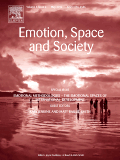
Emotion Space and Society
Scope & Guideline
Advancing Understanding of Emotional Dynamics
Introduction
Aims and Scopes
- Emotional Geographies:
Investigates how emotions are experienced, expressed, and interpreted in various social and spatial contexts, highlighting the significance of emotional landscapes in shaping human interactions. - Spatiality and Place:
Examines the relationship between emotions and different spaces, including urban environments, natural landscapes, and digital realms, focusing on how these contexts influence emotional experiences. - Interdisciplinary Approaches:
Utilizes methodologies from geography, sociology, psychology, and cultural studies to analyze the complexities of emotional experiences across diverse populations and settings. - Impact of Social Issues:
Addresses contemporary social issues such as migration, climate change, and identity politics, exploring how these factors intersect with emotional experiences and spatial dynamics. - Narrative and Reflexivity:
Encourages narrative inquiry and reflexive practices that uncover personal and collective emotional experiences, fostering a deeper understanding of the human condition in relation to space.
Trending and Emerging
- Digital and Virtual Spaces:
An increasing focus on emotions in digital and virtual environments, such as online communities and virtual reality, reflects the growing relevance of technology in shaping emotional experiences. - Intersectionality and Emotions:
Emerging studies that examine the intersectionality of emotions with gender, race, and class, highlighting how these factors influence emotional experiences and societal dynamics. - Environmental Emotions:
Research exploring emotional responses to environmental issues, such as climate change and urban transformation, is gaining prominence as societal awareness of these issues increases. - Affect and Well-being:
A growing emphasis on the relationship between affect, emotional well-being, and mental health, particularly in the context of the COVID-19 pandemic and its aftermath. - Collective and Community Emotional Experiences:
An emerging trend in studying collective emotions and community responses to crises, showcasing how shared emotional experiences shape social movements and community resilience.
Declining or Waning
- Traditional Representations of Space:
There is a noticeable decline in studies that focus solely on traditional or static representations of geographical space, as the journal increasingly emphasizes dynamic, relational, and emotional aspects of spatiality. - Historical Emotional Narratives:
While historical perspectives are still relevant, the focus on historical emotional narratives has decreased, with more contemporary issues and immediate social contexts taking precedence. - Quantitative Approaches:
Quantitative methodologies are appearing less frequently as the journal pivots towards qualitative and narrative approaches that allow for deeper exploration of emotional experiences. - Generic Community Studies:
Research that broadly examines community emotions without specific contextualization or depth is becoming less common, as the journal seeks more nuanced and context-rich explorations. - Solely Theoretical Discussions:
There has been a reduction in purely theoretical articles that do not engage with empirical data or case studies, as there is a stronger emphasis on research that incorporates lived experiences and practical implications.
Similar Journals
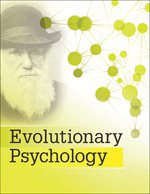
Evolutionary Psychology
Exploring the Roots of Human BehaviorEvolutionary Psychology is a crucial journal published by SAGE Publications Inc, dedicated to exploring the intersection of psychological sciences and evolutionary theory. Established as an Open Access platform since 2003, this journal aims to facilitate the dissemination of groundbreaking research that examines how evolutionary processes shape human behavior and cognitive functions. With a range of articles that cater to various aspects of psychology, especially in fields such as Behavioral Neuroscience, Social Psychology, and general Medicine, the journal holds significant relevance in contemporary academic discourse. Although it currently resides in the lower quartiles (Q4 and Q3) in its respective categories, it provides a vital space for innovative ideas and perspectives, inviting researchers and students to contribute and engage with the rapidly evolving understanding of human psychology through an evolutionary lens. The journal is indexed with an ISSN of 1474-7049, ensuring broad accessibility and outreach to a global audience.

Journal of Rational-Emotive and Cognitive-Behavior Therapy
Cultivating Knowledge for Effective Therapeutic Strategies.Journal of Rational-Emotive and Cognitive-Behavior Therapy, published by Springer, stands as a significant interdisciplinary forum in the field of clinical psychology and experimental and cognitive psychology. With a history spanning from 1983 to 2024, this journal is dedicated to advancing research and practice encapsulating the principles of rational-emotive therapy and cognitive-behavioral approaches. Acknowledged for its impactful contributions, it holds an impressive Q2 ranking in Clinical Psychology and a Q3 ranking in Experimental and Cognitive Psychology as of 2023. The journal serves an essential role in disseminating evidence-based findings that cater to researchers, professionals, and students alike, fostering a deeper understanding of cognitive processes and emotional regulation. We invite you to explore the latest research and case studies, which contribute to the therapeutic landscape, and deepen your knowledge in this evolving field.
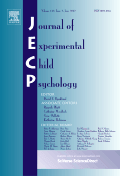
JOURNAL OF EXPERIMENTAL CHILD PSYCHOLOGY
Advancing the Frontiers of Child Psychology ResearchJOURNAL OF EXPERIMENTAL CHILD PSYCHOLOGY, published by Elsevier Science Inc, stands as a premier outlet for high-quality research in the fields of Developmental and Educational Psychology and Experimental and Cognitive Psychology. With an impressive impact factor and recognized within the Q1 category for both developmental and experimental psychology, this journal is dedicated to advancing our understanding of child psychology through rigorous empirical research and theoretical contributions. Indexed with an ISSN of 0022-0965 and E-ISSN 1096-0457, it is a vital resource for scholars aiming to explore the complexities of children's cognitive, social, and emotional development from 1964 to 2024. Engaging with this journal provides researchers, professionals, and students access to cutting-edge findings that inform practice, policy, and future studies in the ever-evolving landscape of child psychology.
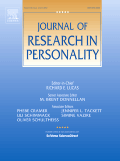
JOURNAL OF RESEARCH IN PERSONALITY
Bridging Research and Real-World Applications in PersonalityJOURNAL OF RESEARCH IN PERSONALITY is a premier academic journal published by Academic Press Inc. Elsevier Science, dedicated to advancing the field of personality research. With ISSN 0092-6566 and E-ISSN 1095-7251, this journal has been a vital resource since its inception in 1973, congregating high-quality, peer-reviewed articles that delve into both theoretical and applied aspects of personality and social psychology. Recognized for its excellence, it is categorized in the Q1 quartile for both Psychology (miscellaneous) and Social Psychology, underscoring its significant contribution to the discipline. Its current Scopus rankings place it in the top quartile among general and social psychology journals, highlighting its influential role in disseminating pivotal research findings. While not an open-access publication, the journal offers subscription-based access, ensuring it reaches a wide readership of researchers, professionals, and students who are eager to explore the complexities of human personality. With its converged years extending into 2024, it continues to pave the way for innovative thinking and collaboration within the ever-evolving landscape of psychology.

Universitas Psychologica
Exploring the frontiers of psychological research since 2007.Universitas Psychologica is a vital academic journal published by the Pontificia Universidad Javeriana, Facultad de Psicología, situated in the vibrant city of Bogotá, Colombia. Since its inception in 2007, this journal has been dedicated to advancing the field of psychology through rigorous peer-reviewed research and innovative insights. With an ISSN of 1657-9267, it serves as a repository for a wide range of psychological studies, focusing on both conventional methodologies and emerging trends in the discipline. Despite holding a Q4 quartile ranking in general psychology and social psychology for 2023, its commitment to nurturing scholarly discourse and fostering an academic community remains unwavering. Universitas Psychologica emphasizes open accessibility to its content, making significant research available to a global audience. As it converges towards 2024, the journal continues to aim for heightened visibility and influence within the research community, aspiring to support the next wave of psychological scholarship.
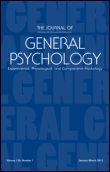
JOURNAL OF GENERAL PSYCHOLOGY
Fostering Academic Excellence in Psychology and BeyondJOURNAL OF GENERAL PSYCHOLOGY, published by Routledge Journals, Taylor & Francis Ltd, stands as a premier platform for the dissemination of innovative research in the vast field of psychology. Established in 1928 and continuing its impactful publication until 2024, this journal encompasses a diverse scope, including significant contributions in Experimental and Cognitive Psychology, Gender Studies, and broader Arts and Humanities, making it a vital resource for scholars, practitioners, and students alike. With esteemed rankings such as Q1 in Arts and Humanities (miscellaneous) and exceptional positions in Gender Studies and Experimental Psychology, which respectively hold ranks of #17 and #33 in their fields, the journal is recognized for its rigorous scholarship and commitment to advancing knowledge. While it does not offer open access, its compelling content remains accessible to a wide academic audience, ensuring that groundbreaking findings and theoretical advancements continue to influence the discipline.
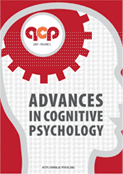
Advances in Cognitive Psychology
Bridging Theory and Practice in Cognitive ScienceAdvances in Cognitive Psychology is a premier peer-reviewed journal published by UNIV ECONOMICS & HUMAN SCIENCES WARSAW, dedicated to the exploration of psychological processes underlying cognition. With its open access model implemented since 2005, the journal facilitates wide-ranging dissemination of cutting-edge research across various branches of psychology, including applied, clinical, experimental, and cognitive psychology. Despite its modest standing in terms of impact factor, reflected in its Q3 and Q4 rankings across numerous subfields, it remains an important platform for emerging researchers and seasoned professionals alike, aiming to foster insight into complex mental processes and enhance understanding of behavioral patterns. The journal's commitment to accessibility empowers a diverse community of readers, including students, to engage with innovative studies and reviews, contributing to the collective knowledge within the psychological sciences. Located in Poland, Advances in Cognitive Psychology is open for submissions from worldwide researchers, encouraging a global perspective on cognition and behavior.
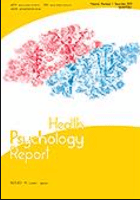
Health Psychology Report
Transforming Knowledge into Practice in Clinical PsychologyHealth Psychology Report is an esteemed journal published by TERMEDIA PUBLISHING HOUSE LTD, dedicated to advancing research and practice in the fields of clinical psychology and psychiatry. Established as an Open Access journal in 2013, it allows unrestricted access to groundbreaking research, brimming with innovations and insights that address psychological and mental health challenges in contemporary society. With its registered ISSN 2353-4184 and E-ISSN 2353-5571, the journal serves as a critical platform for professionals and academics to disseminate knowledge and foster collaboration. Recognized for its influence, it holds a Q3 ranking in both Clinical Psychology and Psychiatry and Mental Health, alongside Scopus rankings that place it within the top half of its field. Operating from Poznań, Poland, the journal covers a spectrum of topics aligned with its objective to bridge the gap between health psychology research and practical application, making it essential for those invested in the improvement of mental health outcomes.
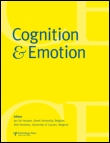
COGNITION & EMOTION
Advancing Insights into the Mind-Emotion ConnectionCOGNITION & EMOTION is a leading academic journal published by Routledge Journals, Taylor & Francis Ltd, focusing on the dynamic interactions between cognitive processes and emotional responses. Established in 1987, this esteemed journal has made significant contributions to the fields of Arts and Humanities, Developmental and Educational Psychology, and Experimental and Cognitive Psychology, consistently ranking in the top quartile (Q1) across various categories. Housed in the United Kingdom, COGNITION & EMOTION boasts a remarkable impact factor, underscoring its influence and importance in advancing psychological research and theory. While this journal does not offer open access, it remains a vital resource for scholars, professionals, and students seeking to deepen their understanding of emotional and cognitive phenomena. With a commitment to rigorous peer-reviewed research and innovative insights, COGNITION & EMOTION is essential for anyone aiming to stay at the forefront of psychological studies.
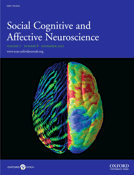
Social Cognitive and Affective Neuroscience
Bridging Neuroscience and Social PsychologySocial Cognitive and Affective Neuroscience, published by Oxford University Press, is a leading academic journal in the fields of cognitive neuroscience and experimental cognitive psychology. With an impact factor placing it in the Q1 category across three disciplines, including medicine, this journal stands at the forefront of research, promoting innovative studies that explore the intricate relationship between social processes and neural mechanisms. Since becoming Open Access in 2017, it has enhanced accessibility for researchers worldwide, facilitating the dissemination and discussion of groundbreaking findings. The journal, which has evolved significantly since its inception in 2006, is ranked among the top 10 in experimental and cognitive psychology and is highly regarded within the cognitive neuroscience community, making it a crucial resource for professionals, academics, and students eager to advance their understanding of the neural substrates underlying social cognition and emotion. The editorial board invites submissions that contribute to the interdisciplinary dialogue surrounding these critical areas of research, ensuring that the journal remains a vital platform for scholarly exchange.